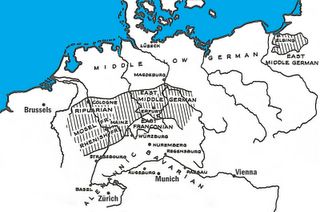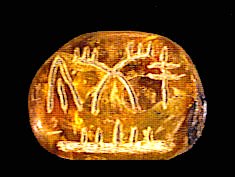Putting things in perspective
Some of my curiosity is being sated by John T. Waterman’s 'History of the German Language'—you know, Sanskrit, spirants vs. stops, the German sound shift, human migration and a reverse engineered language called Indo-European. Seems Tacitus’ Suebi were composed of several distinct tribes, one of which—the Marcomanni—was defeated by the Romans in 9 B.C. They subsequently hung out in the Bohemian forests of the Czech Republic for awhile, before finally moving to southern Bavaria in the 6th century A.D. It is due to precisely this sort of thing that the vernacular changes drastically if you travel for half an hour in any direction.

In the late 17th century a group of Germans from around Frankfurt founded Germantown, Pennsylvania (immigrants continued to pass through here for years—if I had to take a wild guess, I would say both sides of my family were among them). They spoke a Rhenish Palatinate dialect, as incomprehensible to the average German today, as it is to the average American. The emergence of Yiddish, in the fourteenth century, can also be traced back to the Rhineland-Palatinate...this was slightly later than the New High German Diphthongization of 'u' into 'au' started spreading out from around the area that now contains Munich. This produced altered words, for example, the word Hus became Haus.

We saw this piece of amber at the local archaeological museum last week. The markings are in the ancient Greek language of Linear B, it’s 2,500 years old and it was found in Bernstorf about 20 miles north of here...the oldest town in Bavaria, which was an important trading post on a trade route connecting the Nile and the Ostsee (Baltic), as far back as 3,500 years ago. So it’s not like they haven’t seen their share of languages around here, who am I to complain about a little German. Besides, the locals tell me there are not only two more cases in Latin than there are in German, but that college prep here includes one of two lengths of Latin study...the shorter of the two being seven years.

In the late 17th century a group of Germans from around Frankfurt founded Germantown, Pennsylvania (immigrants continued to pass through here for years—if I had to take a wild guess, I would say both sides of my family were among them). They spoke a Rhenish Palatinate dialect, as incomprehensible to the average German today, as it is to the average American. The emergence of Yiddish, in the fourteenth century, can also be traced back to the Rhineland-Palatinate...this was slightly later than the New High German Diphthongization of 'u' into 'au' started spreading out from around the area that now contains Munich. This produced altered words, for example, the word Hus became Haus.

We saw this piece of amber at the local archaeological museum last week. The markings are in the ancient Greek language of Linear B, it’s 2,500 years old and it was found in Bernstorf about 20 miles north of here...the oldest town in Bavaria, which was an important trading post on a trade route connecting the Nile and the Ostsee (Baltic), as far back as 3,500 years ago. So it’s not like they haven’t seen their share of languages around here, who am I to complain about a little German. Besides, the locals tell me there are not only two more cases in Latin than there are in German, but that college prep here includes one of two lengths of Latin study...the shorter of the two being seven years.

<< Home